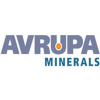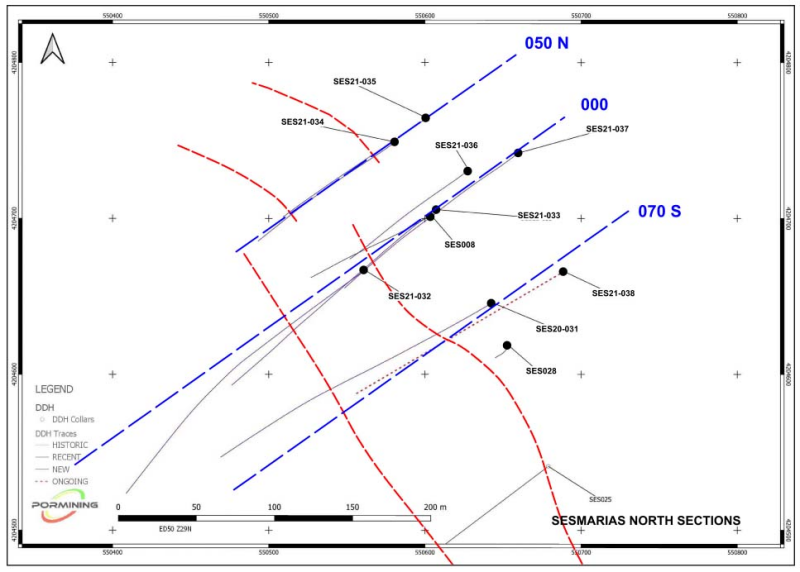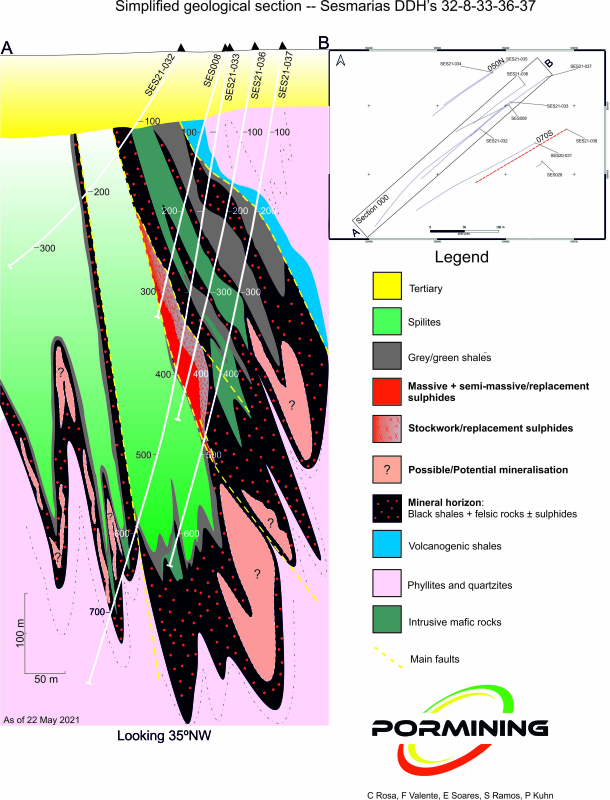Avrupa Minerals Drills 22.25 meters of 0.42% Copper and Additional Intercepts at Sesmarias North, Alvalade Project, Portugal
(TheNewswire)




-
- Discovery of downdip massive sulfide mineralization on 8 Lens;
-
- 3,580 meters drilled to date in seven diamond drill holes on three sections;
-
- Results from SES21-032 through SES21-036 included;
-
- SES21-033: 22.25 meters @ 0.42% Copper, 2.07% Zinc; 1.05% Lead; 0.58 ppm Gold, and 39.3 ppm Silver in semi-massive to massive sulfide mineralization from 363.00 meters to 385.25 meters;
-
- SES21-036: 17.00 meters @ 0.39% Copper; 2.11% Zinc; 1.10% Lead; 0.4 ppm Gold; and 34.1 ppm Silver in semi-massive to massive sulfide mineralization from 406.10 meters to 423.20 meters;
-
- Mineralization in both holes lies within a wider zone of stockwork sulfide veins and replacements in strongly altered black shales and volcanic rocks of the mineral host horizon;
-
- SES21-037: Just completed, targets further downdip potential on Section 000;
-
- SES21-038: Commences on Section 070 S to test strike potential to the south.
June 9, 2021 – TheNewswire - Avrupa Minerals Ltd. (TSXV:AVU) (OTC:AVPMF) is pleased to present an interim progress report covering drilling at the Sesmarias Copper-Zinc Prospect within the Alvalade Project (Alentejo, Portugal). The program is a joint venture between Avrupa Minerals and Minas de Aguas Teñidas, S.A. (MATSA) and is operated by Avrupa through the JV entity PorMining Lda. To date, the Company has completed seven diamond drill holes on three different fences, totaling 3,580 meters, and has started an eighth hole testing potential massive sulfide mineralization on Section 070S, located approximately 70 meters south of Section 000.
Paul W. Kuhn, President and CEO of Avrupa Minerals, commented, “We have now extended the 8 Lens 150 meters downdip from a 5-meter intercept in SES008 of 0.64% Cu, 36.8 g/t Ag, 0.94% Pb, and 1.54% Zn to intercepts of 20+ meters in SES21-033 and 036. This is the first time that we have intercepted significant downdip mineralization on any of the massive sulfide lenses at Sesmarias.
Our upgraded understanding of the structural controls of the mineralization suggests longer potential strike length possibilities which we will initially follow-up to the south in SES21-038. This hole will be collared 50 meters northeast of SES20-031 which just touched on mineralization. As we look to extending the 8 Lens to the south on Section 70S, and locating the potential copper-rich zones there, we are also making drill plans for extension of the 8 Lens to the north and to re-visit the Discovery Lens area.”
Section 000.
The Company has now drilled five holes, in different phases of drilling, on Section 000 which includes, from west to east, SES21-032, SES008, SES21-033, SES21-036, and SES21-037. We previously reported results for SES008 (May 2014) and SES21-032 (February 2021) along this section, and for SES20-031 on Section 70S (February 2021).
Figure 1. Plan view of Sesmarias North drilling, with cross section lines (in blue) and surface expression of the 8 Lens Target Zone (in red). Drilling is complete on Section 000 for now, and the drill rig has moved southeast to Section 070 S. The new hole, SES21-038, on Section 070 S, targets potential massive sulfide mineralization in a geological position equivalent to mineralization intersected in SES21-033 and 036.
SES21-032. As reported in February 2021, this hole cut the mineral horizon black shales, but above and distal to massive sulfide mineralization, as shown in the cross section below. Results included low anomalous levels of important indicator metals, including arsenic, antimony, manganese, and molybdenum. Copper, lead, and zinc showed weakly elevated levels, as well, suggesting some measure of proximity to massive mineralization in the subsequent drill holes. This kind of geochemical pattern will assist in vectoring towards mineralization in future target areas.
SES008. The Company drilled the 8 Lens discovery hole in 2014, and reported 5.0 meters of 0.64% copper, 0.94% lead, and 1.54% zinc, inside a slightly wider interval of 5.5 meters of 1.17 ppm gold and 36.8 ppm silver. Massive sulfide mineralization lies within a wider zone of 33.1 meters of sulfide-bearing black shales and volcanics. The entire sulfide zone is bounded, top and bottom, by faulting.
SES21-033. Discovery of downdip massive sulfide mineralization of the 8 Lens in SES21-033, collared five meters northeast of SES008. After passing through the upper bounding fault zone, the hole intercepted 31.4 meters of disseminated, laminated, and stockwork sulfide mineralization, beginning from a depth of 331.6 meters and continuing downwards to 363.0 meters. Total amount of sulfides generally increases with depth, as do anomalous levels of copper, lead, and zinc. Significant copper-lead-zinc mineralization in massive sulfide material begins at 363.0 meters and terminates at 385.25 meters at the lower fault. The complete mineral zone, bounded by faults, totals 53.65 meters.
|
Meters |
From |
To |
Cu (%) |
Zn (%) |
Pb (%) |
Au (ppm) |
Ag (ppm) |
|
22.25 |
363.00 |
385.25 |
0.42 |
2.07 |
1.05 |
0.58 |
39.3 |
|
Incl. |
Best overall zone |
||||||
|
6.00 |
375.60 |
381.60 |
0.38 |
4.14 |
2.04 |
0.81 |
63.6 |
|
And |
Best copper zone |
||||||
|
4.65 |
380.60 |
385.25 |
0.66 |
||||
Table 1. SES21-033 intercept information.
SES21-036. This hole was collared 30 meters to the northeast of SES21-033. In hole 036, the entire fault-bounded zone of sulfide-bearing black shales and volcanics increases to 80.2 meters, with 17.0 meters of massive sulfide mineralization visible in the core. The hole entered the sulfide mineralized zone at 342.90 meters, with increasing and more intense stockwork mineralization followed by semi-massive sulfides downwards to 406.10 meters. Metal values increase downhole with increased amounts of sulfides. The drillhole passed through semi-massive sulfides at this point, and continued through massive mineralization to 423.10 meters, where it is truncated by a fault. The mass also shows internal higher-grade base metal zonation, as noted in the table below. Further review is necessary to assist in vectoring towards the potential high-grade portions of the deposit.
|
Meters |
From |
To |
Cu (%) |
Zn (%) |
Pb (%) |
Au (ppm) |
Ag (ppm) |
|
17.00 |
406.10 |
423.10 |
0.39 |
2.11 |
1.10 |
0.40 |
34.1 |
|
Incl. |
Best overall zone |
||||||
|
4.00 |
411.10 |
415.10 |
0.33 |
4.41 |
2.26 |
0.59 |
51.7 |
|
And |
Best copper zone |
||||||
|
7.00 |
415.10 |
422.10 |
0.47 |
||||
|
And |
Best Zn-Pb-Ag zone |
||||||
|
2.00 |
413.10 |
415.10 |
5.98 |
3.34 |
64.0 |
||
|
And |
Best gold zone |
||||||
|
4.00 |
402.10 |
406.10 |
1.03 |
||||
|
Total copper zone (semi-massive to massive sulfides) |
|||||||
|
56.00 |
367.10 |
423.10 |
0.30 |
0.42 |
|||
Table 2. SES21-036 intercept information. Note copper-gold association over the 56-meter stockwork/semi-massive/massive interval. We see this spatial gold-copper correlation in other holes, as gold appears to act as an indicator metal for close proximity to the massive sulfide mineralization.
SES21-037. To attempt to further increase the downdip projection of the 8 Lens, this hole was collared 30 meters to the northeast of SES21-036 along Section 000. However, the massive sulfide body appears to be thinning with depth, and increased faulting surely complicates the sulfide mineralized zone in SES21-037. Geological review is ongoing. Sampling will commence upon completion of the review and compilation of the new information. Results will be expected towards the end of June.
Geological and geochemical results from drilling along Section 000 suggest a downdip projection of about 150 meters of massive sulfides on this section, up to 20 meters thick, and lying within a wider package of lower grade stockwork/replacement sulfide mineralization. Results from both a recent mise-a-la-masse geophysical study and a coincident grid geochemical survey covering the overall 8 Lens target area suggest further massive sulfide potential, both to the northwest and to the southeast.
Figure 2. Section 000: Simplified geological section, showing massive sulfides and stockwork zone in SES008, SES21-033, and SES21-036. The Company just completed SES21-037, but has not yet fully reviewed in detail, nor sampled the hole at this time. The work is in progress, and the Company expects results by the end of June. Note that the mineralized zone from SES008 downdip to SES21-036 is bounded by faulting.
Section 070 S.
Previous drilling at SES20-031 and at SES028 suggests that massive sulfide mineralization could continue to the south from Section 000. We collared SES21-038 on Section 070 S to target potential massive mineralization in a similar geological position to the intercepts in SES21-033 and 036. Drilling in SES028, in 2018-19, intercepted a long interval of stockwork mineralization interpreted to lie geologically below potential massive sulfide mineralization. Drilling in SES20-031, late last year, intersected weakly mineralized silica material interpreted to lie geologically above possible massive sulfide mineralization.
Section 050 N.
The Company drilled two holes on Section 050 N, located 50 meters north of Section 000. Prior to drilling we suspected possible east-west faulting between the two sections, with unknown transposition between the north side and south side of the fault.
SES21-034 and SES21-035. These two holes targeted the northerly continuation of the 8 Lens in roughly the same geological position of the massive sulfide zone intersected in SES21-033. However, geological complications caused by faulting and folding of the target units appear, for all practical appearances, to have transposed the massive sulfide targets somewhat to the east. As both drill holes now appear to have been collared too far to the west, the results indicate that the Company drilled over the potential massive sulfide zone, just as SES21-032 did in Section 000. SES21-034 crossed mineral horizon gray and black shales with elevated results in indicator metals arsenic and antimony, as well as lead. SES21-035 crossed 12.2 meters of stockwork sulfides in mineral horizon black shales from 333.90 meters to 346.10 meters. Geochemical results show anomalous gold, silver, copper, lead, and zinc levels, as well as elevated indicator metals antimony and arsenic, suggesting close proximity to a potential massive sulfide zone.
|
Metal |
Average |
High |
|
Copper |
0.08% |
0.28% |
|
Zinc |
0.42% |
1.51% |
|
Lead |
0.23% |
1.03% |
|
Gold |
0.16 ppm |
0.61 ppm |
|
Silver |
5.96 ppm |
33.9 ppm |
Table 3. SES21-035 stockwork intercept results are strongly anomalous and suggest potential for nearby massive sulfide mineralization. The Company is planning to drill further on Section 050 N. Given this anomalism and a good understanding of the geology, it is apparent that the next hole on this section should be collared to the northeast of SES21-035, to target northerly extension of the 8 Lens and potential copper-zinc mineralization.
In addition to continued work in the Sesmarias North area around the 8 Lens, the Company anticipates moving forward on exploration targets to the north of the 8 Lens in the Brejo area, as reported in the news release of February 24, 2021. Access to potential drilling sites is permitted now, and we are looking to add a second drill rig to the program in the near future. The Company is also re-mapping the Monte da Bela Vista target area and is in the midst of a 375-sample, grid soil collection program to analyze the material using ultra-trace level analytical techniques in a program to assist in target definition and drill collar location.
The continuing work program is fully funded by Minas de Aguas Teñidas, S.A. (“MATSA”). MATSA can initially earn a 51% interest in the Alvalade Experimental Exploitation License property by completing funding requirements set out in the joint venture agreement between the companies. MATSA may then increase their interest in the Project to 85% by preparing a bankable feasibility study. Avrupa previously described the details of the agreement in news releases dated October 1, 2019 and November 20, 2019.
Minas de Aguas Teñidas, S.A. (MATSA) is a private Spanish mining company, which owns and operates three mines in the province of Huelva (Andalusia, Spain): Aguas Teñidas, Magdalena, and Sotiel. MATSA also holds 1,312 km2 of exploration permits in the south of Spain and 1,106 km2 in Portugal. Focused on innovation and the most advanced technology to develop modern and sustainable mines, MATSA is a 50:50 joint venture company of Mubadala Investment Company, a sovereign investor managing a global portfolio aimed at generating sustainable returns for its shareholder, the Government of Abu Dhabi, and Trafigura, one of the world’s leading commodity trading houses.
Avrupa Minerals Ltd. is a growth-oriented junior exploration and development company directed to discovery of mineral deposits, using a hybrid prospect generator business model. The Company holds one 100%-owned license in Portugal, the Alvalade VMS Project, now optioned to MATSA in an earn-in joint venture agreement. Avrupa focuses its project generation work in politically stable and prospective regions of Europe, presently including Portugal and Kosovo. The Company continues to seek and develop other opportunities around Europe.
For additional information, contact Avrupa Minerals Ltd. at 1-604-687-3520 or visit our website at www.avrupaminerals.com.
On behalf of the Board,
Paul W. Kuhn, President & Director
This news release was prepared by Company management, who take full responsibility for its content. Paul W. Kuhn, President and CEO of Avrupa Minerals, a Licensed Professional Geologist and a Registered Member of the Society of Mining Engineers, is a Qualified Person as defined by National Instrument 43-101 of the Canadian Securities Administrators. He has reviewed the technical disclosure in this release. Mr. Kuhn, the QP, has not only reviewed, but prepared and supervised the preparation or approval of the scientific and technical content in the news release.
Information about the Lousal Mine comes directly from published academic documents prepared by the geological survey of Portugal (LNEG), theses from the University of Lisbon, private company documents authored by mine geologists employed at one time by the Lousal Mine, and copies of original mine records. The information is considered accurate, but NOT compliant to present-day NI 43-101 regulations and standards.
Neither TSX Venture Exchange nor its Regulation Services Provider (as that term is defined in the policies of the TSX Venture Exchange) accepts responsibility for the adequacy or accuracy of this release.
Copyright (c) 2021 TheNewswire - All rights reserved.

